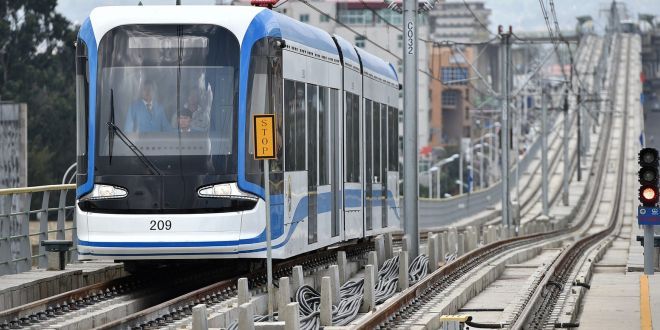ADDIS ABABA — For Tedela Chala, a supermarket worker in Addis Ababa, going to work is no longer the nightmare it used to be in the past, when traffic jams were an integral part of the chaotic city.
“(Now) it takes only 10 minutes to reach my workplace,” the 37-year-old said, describing his fast, cheap and reliable commute on the light railway, the first in sub-Saharan Africa.
Today, the four million residents of the capital rely on the Addis Ababa Light Rail, the 475-million-U.S.-dollar project built with Chinese technology and currently operated by Chinese experts. The Export-Import Bank of China provided 85 percent of the funding.
The light rail and another Chinese-built transport project, the Ethiopia-Djibouti Standard Gauge Rail, are flagship infrastructure projects representing the socioeconomic importance of Chinese engagements in one of Africa’s fastest-growing economies.
The two railways also showcase the transformation of Ethiopia’s infrastructure, eventually providing convenient transportation all the way to its neighboring Djibouti.
Chala says the light rail has brought convenience to his work and life. “I am lucky to have this modern transportation today,” he said. “I am very proud and lucky.”
The 34.25-km light railway, with 39 stations across the city, was built by China Railway Engineering Corporation, which currently operates it together with the Shenzhen Metro Group, another Chinese company.
Beginning operation two years ago, the light rail currently serves an average 101,000 passengers daily, with the number sometimes leaping to 185,000.
The Ethiopia-Djibouti Standard Gauge Rail is providing both passenger and freight transportation between Ethiopia and Red Sea nation Djibouti.Ethiopia, a landlocked country, heavily relies on the seaports of Djibouti with 95 percent of its import and export commodities presently transported via the Port of Djibouti.
Abebe Tola, a carpet trader in Addis Ababa, regularly purchases blankets in Dire Dawa, a city about 510 km from the capital where quality blankets are available at affordable prices.Transportation difficulties are now a thing of the past, Tola said, referring to the Ethiopia-Djibouti railway starting commercial freight and passenger services in January this year. The service is also substantially cheaper.
Read more: Feature: Chinese-built railways put Ethiopia on track to meet 2025 development goals
